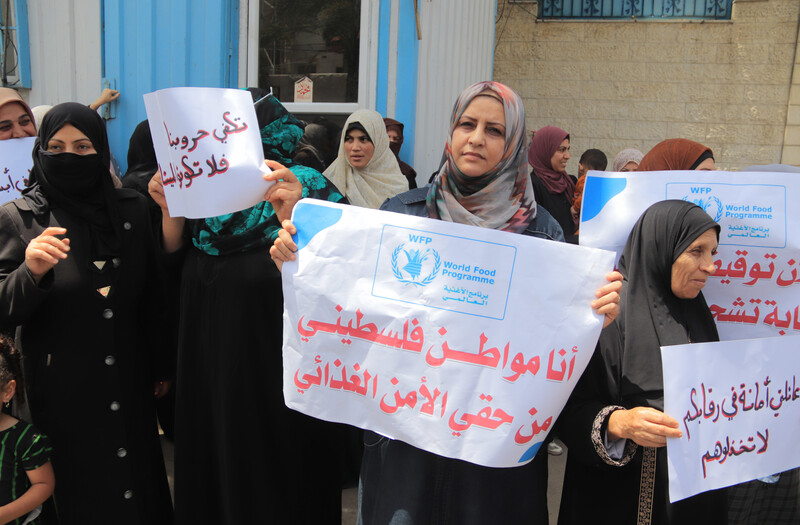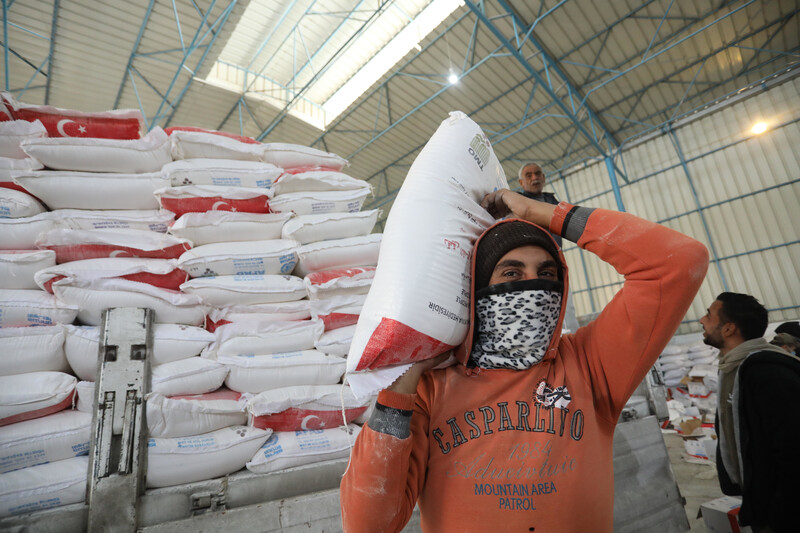Power Suits 3 June 2023

World Food Programme beneficiaries protest against aid cuts in front of the UN Development Program office in Gaza City, 21 May.
APA imagesThe UN secretary-general warned of “catastrophic” consequences on Friday with UNRWA, the UN agency for Palestine refugees, “on the verge of financial collapse.”
Meanwhile, food assistance to Palestinians from the World Food Programme is set to dry up simultaneously, most impacting families in Gaza, where the majority of people are food insecure after 15 years of Israeli-Egyptian blockade.
The World Food Programme this month will be suspending food aid to some 200,000 Palestinians, pointing to a funding shortfall of $51 million. By August, the agency will be forced to “completely suspend operations in the West Bank and Gaza if no funding is received,” affecting an additional 100,000 beneficiaries.
A Hamas official in Gaza told the Tel Aviv newspaper Haaretz that his organization, along with the Palestinian Authority in Ramallah, were appealing to donor states to continue to fund the World Food Programme’s operations in Palestine.The impact will be felt beyond the beneficiaries who are directly affected.
“[Ending the program] will bring about a decrease in purchasing power. When approximately 200,000 people will not receive their financial aid they will not be able to shop in the stores,” the unnamed Hamas official said.
Reversing decades of gains
Additional reduction of already slashed support to the region’s most vulnerable communities amid ever-increasing needs would reverse decades of human development gains, according to Philippe Lazzarini, the head of UNRWA.
Lazzarini said the agency will be forced to suspend schooling for 555,000 boys and girls and health services for more than two million refugees in September without additional support from donor states.
On Friday, he appealed for funds urgently needed to maintain UNRWA’s government-like services, as well as emergency cash and food assistance “for the poorest among the poor” at the UN headquarters in New York City.
UNRWA announced on Saturday that it had secured some $100 million in new pledges, but this was not sufficient to cover the agency’s requirements beginning in September.
During a press conference on Thursday, Lazzarini likened his agency’s situation to that of a slowly sinking ship reaching a tipping point of no return.At present, the existential crisis facing the agency can be reversed, Lazzarini said, but “we need genuine political attention and commitment to prevent further sinking.”
The agency can no longer scrape by on austerity measures and debt accumulation after a decade of chronic underfunding and is looking for “sustainable, long-term, predictable and flexible funding,” according to an appeal made by UNRWA this month.UNRWA has only received 33 percent of its requirements for the year, the agency said.
It is most urgently seeking $75 million for food assistance in Gaza and $30 million for cash assistance to Palestinian refugees in Syria, Jordan and Lebanon.
UNRWA also needs $12 million to maintain cash assistance to Palestinian refugees in Jordan who were displaced from Syria.
The agency is seeking smaller amounts to respond to the earthquake in Syria and for “cash assistance, emergency health, education and environmental health” in the West Bank “amid unprecedented levels of violence.”
“Nothing short of catastrophic”
António Guterres, the UN secretary-general, remarked during the pledging conference on Friday that “some of the largest and most reliable donors have recently signaled to UNRWA they might reduce their contributions.”
Emphasizing that “UNRWA is on the verge of financial collapse,” Guterres added that “further budget cuts would be nothing short of catastrophic,” with the lives of millions of Palestinians on the line.
UNRWA cannot scale back its government-like services to match diminished voluntary funding, according to Lazzarini.
“When we talk about adapting spending to resources, I am in no position to say well, because we have 20 percent less resources, let’s ask 20 percent of our children to get out of the school,” Lazzarini said.
“That’s not the way public-like services operate.”
Lazzarini called for the renewal of UNRWA’s mandate by the UN General Assembly every three years to be “accompanied by genuine commitment and resources.”

UNRWA staff prepare food rations for refugees in Gaza City in January 2022.
APA images“Our resources have stagnated while at the same time, the region has been hit by multiple crises,” increasing needs amid rising costs, Lazzarini said. “So the tension between the costs and the resources have become more and more unbearable.”
Lazzarini acknowledged that UNRWA, created on a temporary basis in 1949 to meet the needs of Palestinian refugees expelled from their homeland, is reaching its 75th year of existence.
Amid a stagnant political process, “any decrease of services is perceived as a weakening of the future rights of the Palestinian refugees, which makes any transformation impossible,” Lazzarini said.
He indicated that donors such as the US and European states are decreasing their budgets overall and not necessarily targeting UNRWA.
Contributions from Arab states peaked with those countries funding some 25 percent of UNRWA’s budget in 2018, but hit a low of three percent in 2021.
Palestine deprioritized for Ukraine
During his address at the pledging conference on Friday, Lazzarini pointed to multiple factors that have impacted UNRWA’s funding.
“The Israeli-Palestinian conflict is no longer a priority due to shifting geopolitical dynamics in the region and globally, and the emergence of new humanitarian crises – like in Ukraine today,” he said.
Washington, which provides a floor of $3.8 billion in military aid to Israel each year, has directed more than $75 billion in support to Ukraine since Russia’s invasion in February 2022 – more than half of it military aid.
Most member states of NATO and the European Union have also provided substantial aid packages to Ukraine.
Western diplomats told Haaretz that the war in Ukraine is the “main reason for funding difficulties,” with European countries reducing donations “in order to support the government in Kyiv while increasing their own defense expenditures.”
The diplomats also pointed to the long stalled political process, with one anonymous official saying “in Israel, there is a government that doesn’t want to do anything on the Palestinian issue, but the moment there is a humanitarian crisis, it sends envoys asking us to increase our financial support.”
While that may be a valid grievance, it is undermined by the fact that UNRWA’s main Western donors refuse to pressure Israel to end its violations of international law and Palestinian rights. Letting the most vulnerable Palestinians sink deeper into deprivation and despair while ensuring Israel’s impunity remains intact only exacerbates these states’ complicity.
In the grand scheme of things, Lazzarini said on Thursday, UNRWA is asking for nothing: “When you think that a lack of $200 million can reverse decades of successes, and could contribute to further instability in an already volatile region, I think this extra mile, collectively, is very little.”





